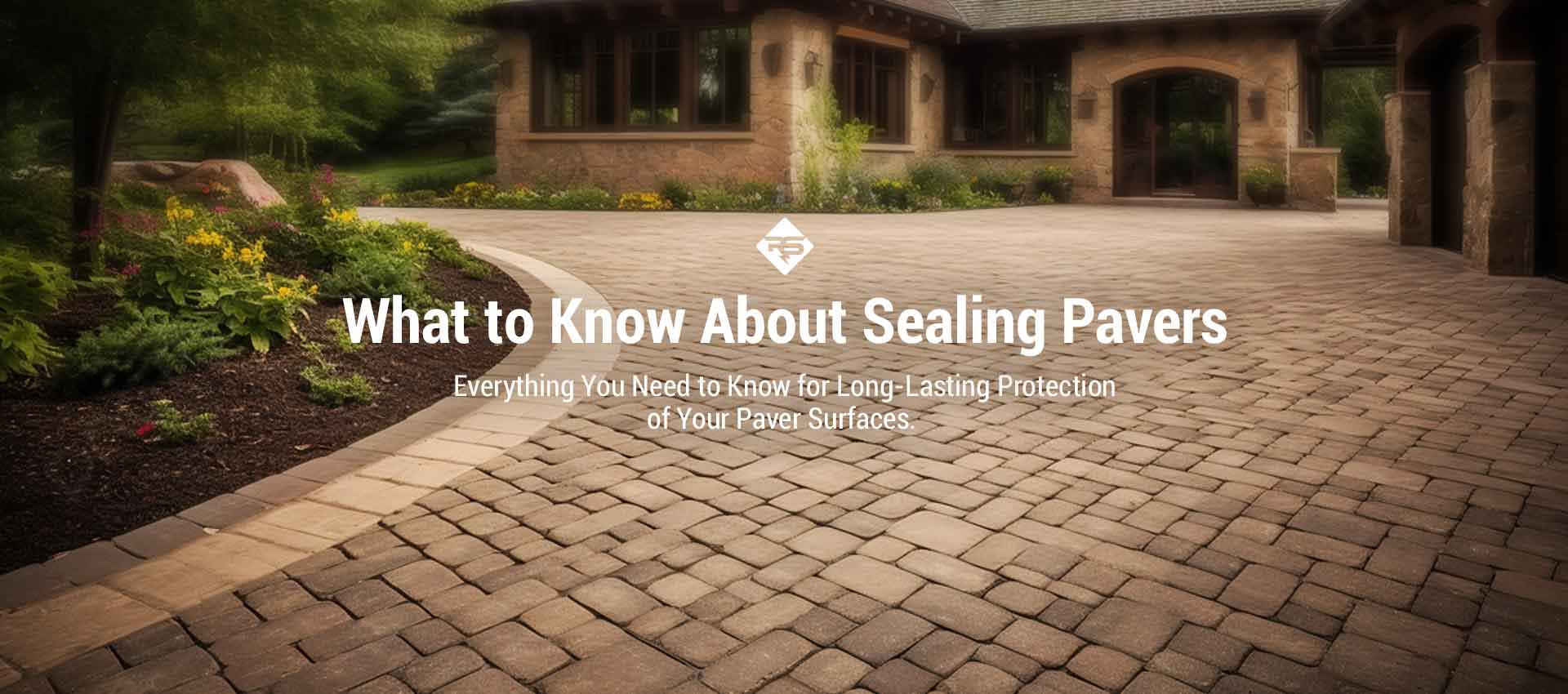Do Yourself a Favor – Seal Your Pavers
Whether your pavers are part of a driveway, walkway, patio, or other hardscaping, protecting them with a high-quality paver sealer is one of the smartest decisions you can make as a homeowner. Over time, unsealed pavers are vulnerable to fading, stains, erosion, weed growth, and surface wear—especially in high-traffic or weather-exposed areas.
Sealing pavers helps preserve their natural color, enhances curb appeal, and extends the life of your outdoor surfaces. But with so many products on the market, choosing the best paver sealer for your needs can feel overwhelming.
In this guide, we’ll explore:
-
Why paver sealing matters
-
The types of sealers for pavers and how they work
-
Tips on how to seal pavers for long-lasting results
Whether you’re sealing a newly installed paver patio or restoring an older paver driveway, this article will give you the insight you need to make an informed choice and protect your investment.
Pavers, Pavers Everywhere
Pavers are a top choice for driveways, patios, pool decks, walkways, and all types of hardscaping—and for good reason. They’re versatile, durable, and available in a wide range of colors, shapes, and patterns, making it easy to create a one-of-a-kind outdoor space that matches your home’s style.
Whether you’re installing a paver patio, a paver driveway, or a permeable hardscape, these modular units offer both beauty and performance. Thanks to their popularity, the paver industry is booming.
“The ICPI surveys contractors annually and found that between 2020 and 2021, there was a 27% average growth in sales. The awareness and use of concrete pavers, paving slabs, and permeable interlocking concrete pavement continues to grow.” – World of Concrete
This growing demand makes it even more important to understand how to protect your pavers with the right sealer for pavers—especially if you want to preserve their appearance and longevity.
The Benefits of Paver Sealing
Sealing your pavers is a smart way to protect the beauty and durability of your outdoor surfaces. Whether you have a paver driveway, patio, walkway, or pool deck, applying a high-quality paver sealer offers lasting advantages that preserve your investment and enhance curb appeal.
✅ Increased Stain Resistance
A paver sealer creates a protective barrier that helps prevent stains from oil, grease, tire marks, and leaf tannins. It also reduces mold and mildew growth, making it easier to clean spills and maintain your paver’s appearance.
✅ Enhanced Surface Protection
Constant exposure to UV rays, rain, and deicing salts can lead to fading, pitting, and surface cracking. Sealing paversadds a weather-resistant shield that defends against these threats and extends the lifespan of your hardscapes.
✅ Faster Drying Times
Sealed pavers repel water instead of absorbing it, which significantly reduces drying time after rain or cleaning. Dry surfaces are less likely to develop algae, moss, or mildew, keeping your patio or driveway safer and cleaner.
✅ Improved Freeze-Thaw Durability
In colder climates, freeze-thaw cycles can damage unsealed pavers. Water that seeps into the surface expands as it freezes, causing spalling or flaking. A proper paver sealing application helps minimize water absorption, protecting against freeze-related damage.
✅ Reduced Maintenance and Cleaning Costs
While sealing pavers requires some initial effort, it saves time and money in the long run by minimizing ongoing maintenance. Dirt, stains, and grime remain on the surface—making routine cleaning far easier.
✅ Increased Property Value
Well-maintained paver surfaces boost your home’s curb appeal. Applying a patio paver sealer or driveway sealer for pavers ensures that your hardscaping stays in top condition, which can attract buyers and increase resale value.
Maintenance Costs: The Hidden Expense of Unsealed Pavers
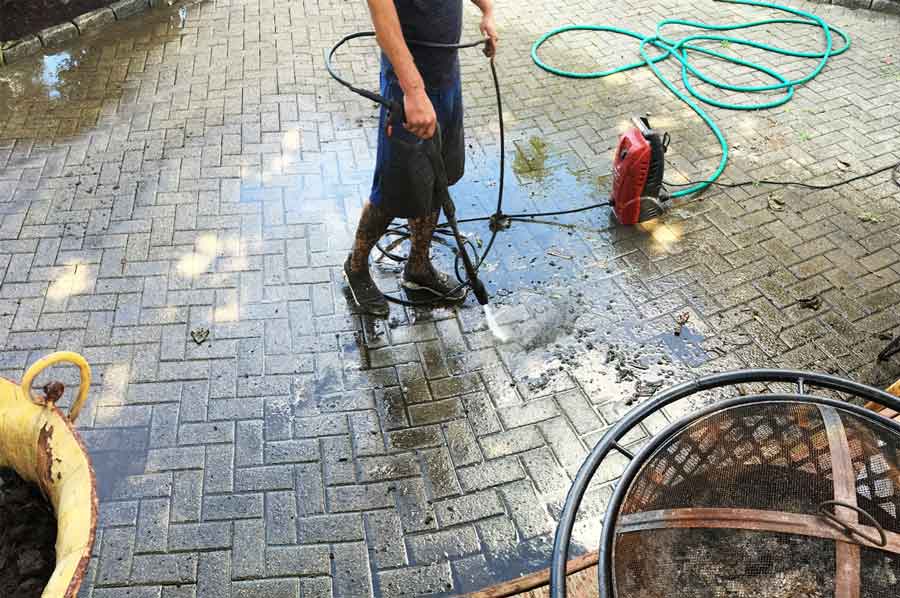
Pavers and hardscapes are prized for their durability, easy installation, and ability to enhance the curb appeal of driveways, walkways, patios, and pool areas. But keeping them looking “like new” year after year is not as effortless as it seems.
Without proper paver sealing, your surfaces are constantly exposed to:
-
Efflorescence and red clay stains
-
Snow, ice, salt, and deicing chemicals
These contaminants not only ruin the appearance of your pavers but also accelerate wear and deterioration—making frequent cleaning and maintenance a necessity.
💸 The True Cost of Maintenance Without Sealing
If you don’t own a pressure washer, seasonal cleaning often means renting one—around $100 per day. Add in chemical cleaners at $20–$50 per gallon, water usage, brushes, and several hours of your time, and the cost quickly adds up.
Prefer to hire a professional? Expect to pay $200–$800 per visit, depending on square footage.
Whether DIY or professional, maintaining unsealed pavers can turn into a recurring expense that eats away at your budget.
✅ Paver Sealing Saves You Time and Money
The solution? Seal your pavers.
A quality paver sealer acts as a barrier, preventing moisture, stains, and grime from soaking in. This means:
-
Less frequent cleanings
-
No need for harsh chemicals
-
Lower water and labor costs
-
Reduced risk of permanent stains or damage
By maintaining sealed pavers, you protect your investment, minimize upkeep, and enjoy cleaner, longer-lasting surfaces with far less effort.
💰 Annual Maintenance Cost Comparison: Sealed vs. Unsealed Pavers
| Maintenance Task | Unsealed Pavers | Sealed Pavers |
|---|---|---|
| Pressure washer rental (2x/year) | $200 | $0 (typically not needed) |
| Chemical cleaners (mold, degreaser, etc.) | $40–$100 | $10–$20 (light touch-ups) |
| Water, tools, rags, buckets | $10–$25 | $5–$10 |
| Professional cleaning (optional) | $200–$800 | $0–$200 (less frequent) |
| Total Annual Cost | $250–$1,125 | $15–$230 |
| Time Spent on Maintenance | 3–6 hours | 30–90 minutes |
| Expected Surface Lifespan | 10-20 years (faster wear) | 20+ years (with protection) |
🔍 Key Takeaway:
Sealing your pavers can reduce maintenance costs by up to 80% annually—while protecting your investment and reducing long-term labor and repair needs.
🔍 What to Look for in a Paver Sealer
Not all paver sealers are created equal. Whether you’re sealing a paver driveway, walkway, patio, or pool deck, choosing the right sealer is critical for long-lasting performance, safety, and visual appeal. Here’s what to look for when selecting the best paver sealer for your project:
🛑 Slip Resistance
Sealing your pavers should not increase the risk of slips and falls.
-
Avoid topical sealers like high-gloss or wet-look paver sealers on driveways, patios, or pool areas—they form a surface film that becomes dangerously slippery when wet.
-
Instead, choose a penetrating paver sealer that soaks into the paver and seals from within. These products do not change the surface texture and are naturally slip-resistant.
💪 Durability
A quality sealer should protect your pavers for years—not months.
-
Penetrating sealers offer the longest-lasting protection by chemically bonding inside the paver, making them resistant to wear, traffic, and environmental exposure.
-
In contrast, film-forming sealers (like acrylics) wear off quickly, especially on driveways and high-traffic areas, exposing your pavers to damage.
☀️ UV Resistance
Outdoor pavers take a beating from the sun.
-
Look for a UV-resistant paver sealer to prevent surface fading, dulling, and yellowing.
-
Acrylic sealers, even if labeled “non-yellowing,” often degrade under UV exposure and become patchy or brittle over time.
-
For long-term UV stability, penetrating water-based sealers are the superior option.
✅ Easy Application & Safety
The days of choosing between solvent-based and water-based sealers are over.
-
Modern water-based paver sealers deliver exceptional performance without the hazards of flammable, odorous solvent-based products.
-
They’re safe for people, pets, and plants, and can be applied using a basic pump sprayer or roller—no special equipment required.
🔑 Key Takeaway:
For the safest, most effective results, choose a penetrating, water-based paver sealer that offers long-term durability, UV resistance, and easy application—without compromising safety or slip resistance.
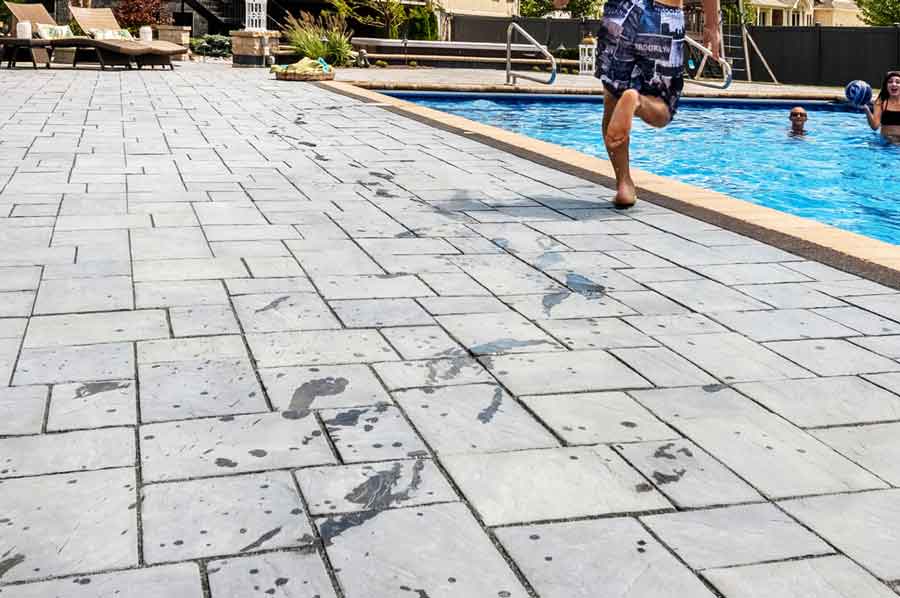
💧 What About “Wet Look” Paver Sealers?
The appeal of wet-look paver sealers—especially glossy acrylic sealers—is easy to understand. They deepen color, add a rich sheen, and give pavers or bricks a freshly cleaned, vibrant look. But beneath the shine, these topical sealers come with several drawbacks that homeowners should carefully consider.
🚫 Short Lifespan & High Maintenance
While the visual enhancement is immediate, wet-look sealers are not durable. These acrylic-based coatings tend to:
-
Wear away quickly in high-traffic areas like driveways and walkways
-
Break down under UV exposure, heat, and moisture
-
Require reapplication every 1–2 years, increasing labor and cost
Over time, this makes them less cost-effective than penetrating paver sealers, which offer deeper, longer-lasting protection.
🎨 Fading & Blotching
As the coating degrades, wet-look sealers often fade unevenly, leaving behind blotchy or patchy areas. This inconsistent appearance detracts from the aesthetics they were meant to enhance.
🔒 Limited Protection
Although they provide some resistance to moisture and staining, most wet-look paver sealers:
-
Lack UV stability
-
Do not protect against salt damage or freeze-thaw cycles
-
Are slippery when wet, posing a hazard on sloped or wet surfaces
🔑 Bottom Line:
If your top priority is long-term protection, low maintenance, and a safe, slip-resistant surface, penetrating paver sealers are a better investment. While wet-look sealers offer short-term visual appeal, their performance and longevity fall short for most outdoor applications.
🏆 Choose from the Best Paver Sealers Available
Looking for the best paver sealer to protect your patio, driveway, walkway, or pool deck? We’ve done the research—and after 25+ years of manufacturing concrete and masonry sealers, we know what works. Our water-based, easy-to-apply formulas are designed to deliver long-lasting protection without the mess, fumes, or headaches of solvent-based products.
✅ Top Recommended Paver Sealers
🔹 LastiSeal Brick & Concrete Sealer
Our best-selling penetrating paver sealer—formulated for superior performance.
-
Penetrates deep into the paver, not just the surface
-
Hardens and strengthens the paver as it cures
-
Outlasts silane & siloxane sealers, offering multi-year durability
-
Ideal for driveways, patios, pool decks, and walkways
If you’re looking for the most durable sealer for pavers, LastiSeal is your top choice.
💰 Budget-Friendly Alternative: PaverArmor Penetrating Paver Sealer
A highly concentrated silane/siloxane blend offering excellent value.
-
Provides up to 10 years of water and salt protection
-
Leaves no surface film—breathable and non-slip
-
Perfect for homeowners who want premium protection without the premium price
Whether you need to seal newly installed pavers or protect aging hardscaping, RadonSeal offers the best paver sealing products for long-term results. Choose the one that fits your needs and budget—and keep your outdoor surfaces looking like new.
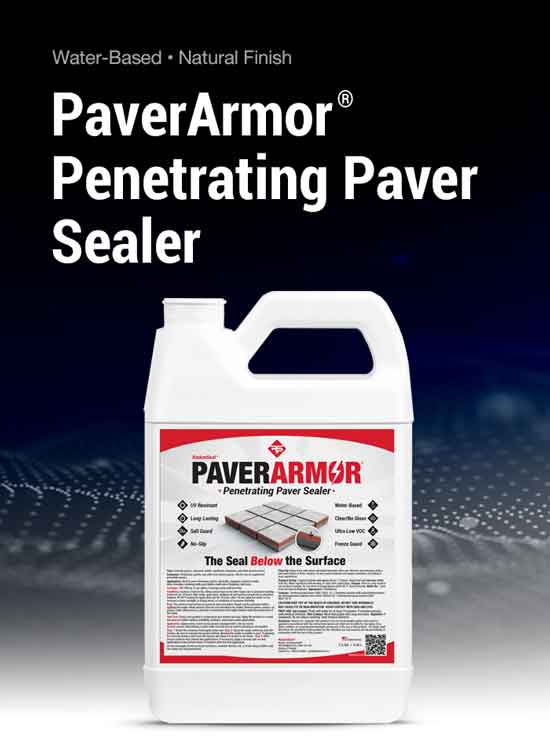
Get It on Amazon
Buy Direct
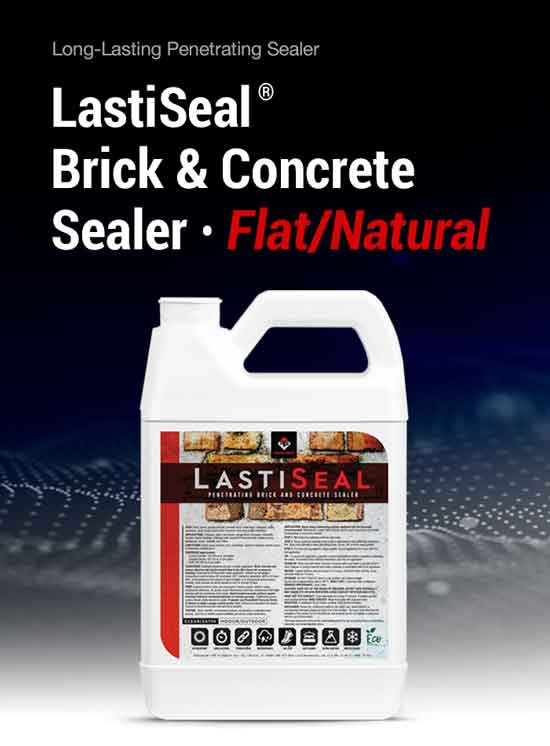
Get It on Amazon
Buy Direct
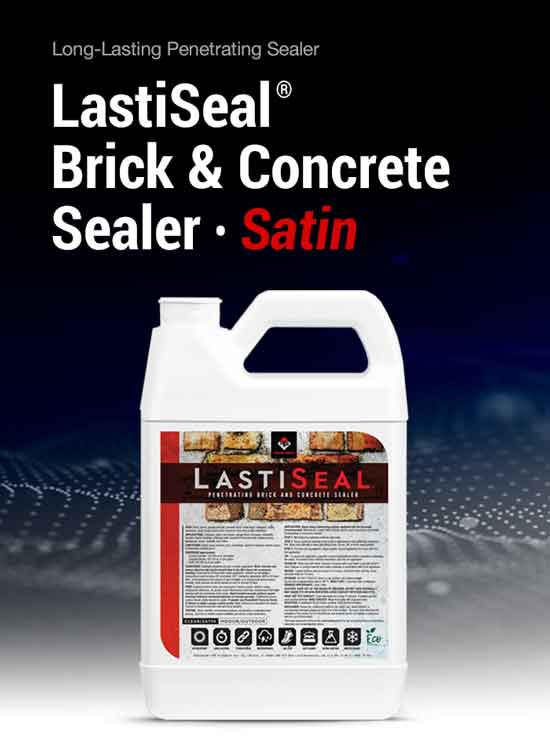
Get It on Amazon
Buy Direct
🧼 Paver Sealing Should Start With a Clean Surface
Before sealing your pavers or bricks, it’s critical to start with a thorough cleaning. A properly cleaned surface ensures maximum penetration and performance from your paver sealer—without interference from embedded dirt, efflorescence, or organic buildup.
BrickTastic® Brick & Paver Cleaner is the ideal solution for this step.
-
Deep-cleans porous materials like pavers, bricks, and concrete
-
Breaks down stains, grime, and organic matter without harming the surface
-
Prepares your pavers for superior sealer absorption and bonding
A clean, dry surface is essential for the sealer to bond correctly and provide long-lasting protection. By using BrickTastic first, you set the stage for enhanced durability, appearance, and water resistance.
👉 For best results:
-
Clean with BrickTastic
-
Let the surface dry completely
-
Apply your paver sealer as directed
Don’t skip the prep—your paver sealer is only as good as the surface underneath.
🧱 Not All Pavers Are Created Equal
Pavers are prized for their durability and design flexibility, often outperforming poured concrete slabs—especially under extreme weather conditions. But here’s the catch: not all pavers are created equal.
Paver quality varies by manufacturer, material composition, and intended use. The three most common types of pavers include clay brick pavers, concrete pavers, and natural stone pavers. Each offers unique advantages—and challenges—when it comes to paver sealing and maintenance.
🔸 Clay Brick Pavers
-
Considered the most elegant and timeless option
-
Naturally stain-resistant and hold their color well
-
Easy to install in a variety of patterns
-
More expensive to install, but brick is highly durable
-
Less prone to UV fading than concrete
🔸 Concrete Pavers
-
Popular for both residential and commercial hardscaping
-
Come in a wide variety of colors, shapes, and sizes
-
High compressive strength (~8,000 psi)
-
Absorb less water (around 5%) than poured concrete (7–9%)
-
Susceptible to UV fading and surface wear over time
-
Strength and porosity vary by manufacturer, which impacts sealing performance
🔸 Natural Stone Pavers
-
Includes granite, limestone, bluestone, slate, and flagstone
-
Offer a natural, upscale appearance ideal for landscapes
-
Naturally resistant to cracking, spalling, and freeze-thaw damage
-
Less porous and typically do not require sealing as frequently
-
Most durable option—but also the most expensive
👉 Pro Tip:
Before applying a paver sealer, know your paver type. The best paver sealer for brick pavers may not be ideal for concrete or stone. Each material has its own porosity, strength, and sealing needs.
💧 When Using a Paver Sealer, Porosity Matters
Not all pavers absorb sealer the same way—and that’s a critical factor when choosing the best paver sealer for your project.
Pavers can be permeable, pervious, or porous—terms often used to describe materials that allow water to pass through. While the specific definitions vary, the key takeaway is this: surface porosity has a direct impact on sealer performance.
🏗️ How Porosity Affects Sealer Absorption
Modern manufacturing techniques and chemical additives (like polymers) are often used to:
-
Increase paver strength and density
-
Protect colorants from UV damage
-
Reduce water absorption
But these benefits come with a trade-off—lower porosity. When the surface is too dense, penetrating paver sealers may not fully absorb. Instead, the sealer may:
-
Build up on the surface
-
Alter the texture (reduced slip resistance)
-
Affect appearance (unwanted sheen or spotting)
That’s why understanding your paver type and porosity is crucial before sealing.
🧪 Penetrating Sealer Not an Option? Consider This
If your pavers are too dense or treated to resist moisture absorption, a topical sealer or decorative coating may be the only alternative.
⚠️ Caution: These membrane-forming sealers are not ideal for all surfaces. They can:
-
Require frequent reapplication
-
Trap moisture beneath the surface
-
Become slippery when wet
🧱 Pavers Typically Compatible with Penetrating Sealers:
These materials generally have open pores and accept penetrating paver sealers well:
-
Brick
-
Concrete
-
Limestone
-
Sandstone
-
Travertine
-
Adobe
-
Mexican (unglazed clay)
-
Bluestone
-
Lannon stone
⚠️ Pavers That May Vary in Surface Porosity:
These surfaces often require testing to determine if a penetrating sealer will absorb properly:
-
Marble
-
Flagstone
-
Fieldstone
-
Granite
👉 Pro Tip: Always test the paver sealer on a small, inconspicuous area before full application—especially on dense or polished stone.
✅ Seal Your Pavers Today and Save Tomorrow
Sealing your paver driveway, patio, pool deck, or walkway might not be at the top of your home maintenance checklist—but it should be! While pavers are known for their durability and aesthetic appeal, they are not immune to shifting, settling, puddling, and uneven wear over time. And unfortunately, poor installation only accelerates these issues.
If you were lucky enough to purchase a home with a paver area already installed, keep in mind—paver installation is not cheap. Even well-installed hardscaping will eventually show signs of age and wear.
Applying a high-quality paver sealer like RadonSeal is a smart, cost-effective way to protect that investment. Sealing:
-
Strengthens the surface
-
Blocks water and contaminants
-
Reduces erosion and staining
-
Preserves the color and texture of your pavers
With just one easy step, you can extend the life of your outdoor paver spaces and reduce long-term maintenance costs. It’s a simple act of prevention that pays off in both appearance and durability.
💡 Want to enhance your paver color too?
Check out our guide: Staining & Sealing Your Patio the Right Way
